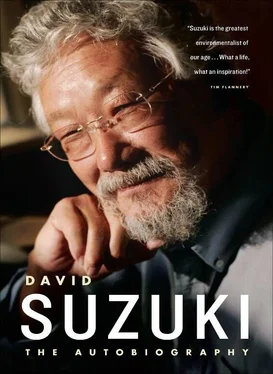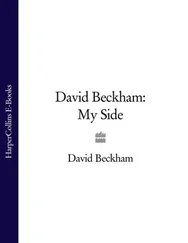Although Dad had been taken to Japan for a month when he was about five, Mom had never visited that country. They were Canadians. Both my Nisei parents were bilingual, but they spoke English at home

Displaying my catch (with unidentified man) at Beatrice Lake in what is now Valhalla Provincial Park
unless they didn't want us to know what they were saying. Almost all the other children in the camps were Nisei, so they were fluently bilingual and could switch into Japanese at will. I as a Sansei didn't speak Japanese and often could not understand what they were saying. Because of my linguistic deficiency, I was picked on by and isolated from the other children.
About a year after we arrived in Slocan, a school was built in a settlement called Bayfarm, perhaps a mile away. I had to knuckle down and start in grade 1. I loved school and was a good student. Dad and Mom would grill me on what I had learned each day, patiently listening to me prattle on. I thought what I had to say was riveting, but now I know their quizzing was a very effective way of going over lessons and helping to correct or guide me along.
I was seven when I enrolled in grade 1, but I was soon skipped through three grades and passed into grade 4 in a year. My father said that at one point I seemed to lose interest in studies and began to complain about having to go to school. He and Mom were very worried, because our education was one of their highest priorities, so one day Dad decided to go to the school to find out what was going on. As he walked along the railroad track that connected Slocan to Bayfarm, he saw a group of kids in the distance chasing a boy. It was winter, and there was a thick blanket of snow on the ground. The victim would slip and fall and the kids would catch up, kicking and hitting him as he struggled to his feet to flee again. The boy was me. Mercifully, I have no recollection of that particular mode of harassment, although I do remember much taunting in the school yard. It took a long time for me to overcome my mistrust and resentment of Japanese Canadians as a result of the way I was treated in those camp days.
White kids we saw rarely, and those we did encounter were Doukhobors accompanying their parents, who visited the camps to sell fresh fruit, meat, and vegetables. I am ashamed of one incident in which I took part as a result of ignorance and childhood stupidity. I have always felt grateful to the Doukhobor farmers, who perhaps were motivated in part by their own memories of repression and injustice in Russia, but to me at that time they seemed alien and mysterious as they rode into Slocan on their laden, horse-drawn carts. One day, a chum told me a “bad word” in Russian, giggling as he made me repeat it until I had it memorized. We didn't know what it meant, and I have no idea how he knew the word or even whether it was a curse or a sexual term. We leaned out of a second-floor window when a farmer's cart came trundling down the alley and stopped below us. My friend and I shouted out the word. When the farmer ignored us, we kept chanting until he picked up the knife he used to cut the tops off vegetables, shouted something at us, and climbed off the wagon.
I guess the shot of adrenaline from fear is why little boys do such things, but I did not enjoy being terrified for my life. We bolted out of that room and into my place and under the bed, trembling and trying to stifle our heavy panting. I doubt the farmer even came into the building, but I was absolutely convinced he was going to kill us. A long while later, we finally crept out of the room, and you can bet we never repeated that stunt. Years later, I apologized for the prank to an audience in the Doukhobor Centre in Castlegar and thanked the Doukhobor community for its support of Japanese Canadians during those trying years.
As the war was drawing to a close, those who renounced their Canadian citizenship and were to receive a one-way ticket to Japan were separated from those who chose to stay in Canada. There was strong coercion among camp members to demonstrate their anger at Canada by signing up to “repatriate” to Japan, and more than 95 percent did. Those who did not sign up were castigated as inu , or “dogs.” My mother met regularly with a group of women to socialize and gossip, but after word got out that we had chosen to remain in Canada, someone in the group insulted her, nobody spoke up for her, and she never went back. To her death, she would not tell my father who had made the remark or what had been said. I have never forgotten that. My mother, one of the gentlest, kindest people I have known, a person who had had to work hard all her life, who would never have knowingly hurt another person, had been deeply wounded by people she considered friends. One of my worst characteristics is that I find it hard to forgive and forget insults and hurts, and this expulsion of my mother further estranged me from the Japanese “community.”
Once the first boatloads of people (including my mother's parents and her older sister's family) arrived in Japan, word quickly came back to Canada that conditions were terrible. Japan had been flattened by bombing, and the people were further demoralized by the atomic bombs dropped on Hiroshima and Nagasaki in 1945 to finally prompt unconditional surrender. Food, clothing, and shelter were extremely hard to find, and people struggled to survive.
At that point, those who had renounced their citizenship began to change their minds and clamored to stay in Canada. They remained in the B.C. camps for so long as they fought deportation to Japan that the government finally allowed them to stay in Canada and resettle wherever they wanted. Many chose to return to the B.C. coast, and Dad was very bitter about that. He hadn't wanted to leave B.C., yet he had been evicted from the province, whereas those who had said they wanted to leave B.C. and Canada ended up staying. My father contemptuously referred to them as “repats” and said they were gutless. First they did not have the strength to decide to stay in Canada and fight for their rights, and then they chickened out of moving to Japan.
After we said we would remain in Canada, we were moved from Slocan to Kaslo, a small town on Kootenay Lake less than a hundred miles from our Slocan Valley camp. For the first time, I attended a school with lots of white kids. But now they seemed alien, and I shied away from them, content to explore this new area of lakes and mountains by myself. The valley in the Kootenay region was rich in pine mushrooms, and that fall I learned where they were likely to be found and how to recognize the bulges on the ground, beneath trees, that indicated where the matsutake were. We filled potato sacks with them and my mother bottled the fragrant mushrooms. Today matsutake pickers do a thriving business exporting them to Japan. Kootenay Lake had a population of kokanee, which are landlocked miniature sockeye salmon. We took the Moyie , a passenger stern-wheeler steamboat, to Lardo, a landing at the head of the lake, where we witnessed a spectacular kokanee run. Like their oceangoing relatives, kokanee turn bright red at spawning time, and the river bottom was carpeted with undulating scarlet ribbons.
One summer day in Kaslo in 1945, I was in the communal bath with an old Japanese man when bells began to peal. “Damme! Maketa!” he exclaimed, meaning “That's bad! We've been beaten!” I didn't know what he meant by “we,” because as far as I was concerned, my side must have won. I dressed and rushed out to the street, where people were celebrating and setting off firecrackers. I edged closer to the crowd, hoping someone might hand me a firecracker. Instead, a big boy kicked my behind and shouted, “Get lost, Jap. We beat you!” That's why the old man was rooting for the other side. The evacuation and the boy had shown me I was not a Canadian to the government or to him; I was still a “Jap.”
Читать дальше



![David Jagusson - Devot & Anal [Hardcore BDSM]](/books/485905/david-jagusson-devot-anal-hardcore-bdsm-thumb.webp)









